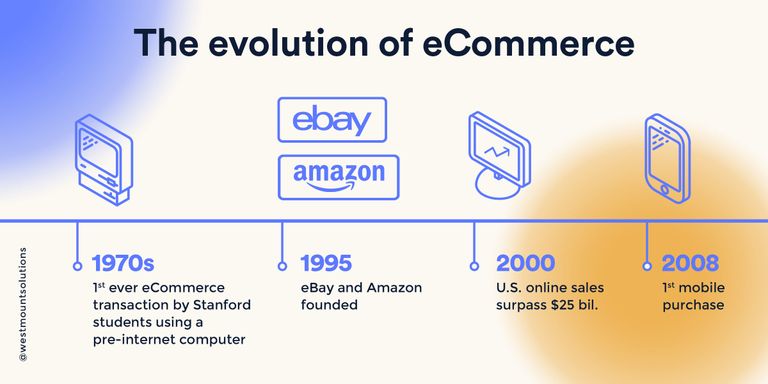In the ever-evolving landscape of commerce, the emergence and evolution of e-commerce platforms have reshaped the way businesses operate and consumers shop. From humble beginnings in the early days of the internet to the sophisticated, global marketplaces of today, e-commerce platforms have undergone a remarkable transformation, driven by advances in technology, changing consumer behaviors, and the relentless pursuit of innovation. In this article, we'll explore the evolution of e-commerce platforms, tracing their journey from inception to global dominance.
The Early Days: Birth of Online Marketplaces
The origins of e-commerce can be traced back to the late 20th century when the internet began to gain widespread adoption. In the early days, e-commerce platforms were rudimentary and primarily focused on facilitating online transactions between buyers and sellers. Websites like eBay, founded in 1995, pioneered the concept of online marketplaces, allowing individuals to buy and sell goods in an open and decentralized environment. These early platforms laid the groundwork for the e-commerce revolution that would follow.
The Dot-com Boom and Bust
The late 1990s saw the emergence of a new breed of e-commerce platforms, fueled by the dot-com boom and the rapid growth of internet technology. Companies like Amazon and Alibaba capitalized on the burgeoning e-commerce market, offering consumers a wide range of products and services at their fingertips. The dot-com bubble, characterized by a frenzy of investment in internet startups, reached its peak in the early 2000s before bursting in spectacular fashion, leading to the collapse of many e-commerce ventures. However, the survivors emerged stronger and more resilient, laying the foundation for the next phase of e-commerce evolution.
The Rise of Mobile Commerce
The proliferation of smartphones and mobile devices in the 21st century ushered in a new era of e-commerce, known as mobile commerce or m-commerce. With the advent of mobile apps and responsive web design, e-commerce platforms became more accessible and convenient than ever before. Consumers could now shop anytime, anywhere, with just a few taps on their smartphones. Companies like Shopify and Magento capitalized on the growing demand for mobile commerce solutions, providing businesses with the tools and technology needed to create seamless mobile shopping experiences for their customers.
The Era of Personalization and Customization
As e-commerce platforms matured, they began to leverage advanced data analytics and artificial intelligence to personalize and customize the shopping experience for individual users. Companies like Amazon and Netflix pioneered the use of recommendation algorithms to suggest products and content based on user preferences and past behavior. This shift towards personalization and customization transformed e-commerce platforms into powerful engines of discovery, allowing consumers to discover new products and brands tailored to their unique tastes and preferences.
The Emergence of Social Commerce
The rise of social media platforms like Facebook, Instagram, and Pinterest gave birth to a new form of e-commerce known as social commerce. By integrating shopping features directly into their platforms, social media companies enabled users to discover and purchase products seamlessly without ever leaving their social feeds. Influencers and celebrities played a key role in driving sales and shaping consumer trends, leveraging their massive followings to promote products and brands to millions of engaged followers. Social commerce blurred the lines between social networking and online shopping, creating new opportunities for businesses to reach and engage with customers in novel ways.
The Future of E-commerce Platforms
Looking ahead, the future of e-commerce platforms promises to be even more exciting and transformative. Advances in technology such as augmented reality (AR), virtual reality (VR), and artificial intelligence (AI) are poised to revolutionize the shopping experience, offering immersive and interactive experiences that blur the lines between the physical and digital worlds. Blockchain technology holds the potential to revolutionize supply chain management and payment processing, making transactions more secure, transparent, and efficient than ever before. As e-commerce platforms continue to evolve and innovate, one thing is certain: the future of commerce is digital, and the possibilities are endless.
In summary, the evolution of e-commerce platforms has been nothing short of remarkable, from the humble beginnings of online marketplaces to the sophisticated, global marketplaces of today. Driven by advances in technology, changing consumer behaviors, and relentless innovation, e-commerce platforms have transformed the way businesses operate and consumers shop, ushering in a new era of convenience, accessibility, and choice. As we look to the future, the possibilities for e-commerce platforms are limitless, promising to reshape the way we buy and sell goods for generations to come.

Upvoted. Thank You for sending some of your rewards to @null. Read my last posts to make sure that BLURT burning is profitable for you. Before using this bot please make sure your account has at least 100 BP. Get more BLURT:
@ mariuszkarowski/how-to-get-automatic-upvote-from-my-accounts@ blurtbooster/blurt-booster-introduction-rules-and-guidelines-1699999662965@ nalexadre/blurt-nexus-creating-an-affiliate-account-1700008765859@ kryptodenno - win BLURT POWER delegation